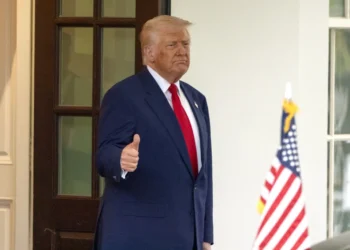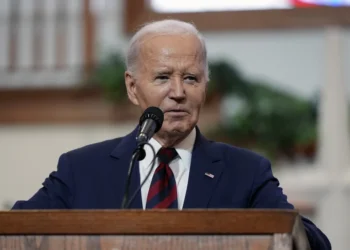Despite relentless pressure, President Donald Trump has thus far resisted the push for a regime-change war with Iran, thanks in large part to the growing influence of America First realists fighting to reclaim U.S. foreign policy from the permanent war machine.
But that influence is under siege, as evidenced by the shake-ups within the Pentagon as well as external forces in the media targeting administration officials who have preached realism and restraint over escalation.
Starting from within the Pentagon, Dan Caldwell, a former senior adviser to Defense Secretary Pete Hegseth, recently appeared on the Tucker Carlson show to discuss the circumstances surrounding his firing for allegedly leaking classified information, an allegation he vehemently denies.
Caldwell was one of three staffers who were recently terminated from their positions at the Pentagon. All three staffers, coincidentally, but perhaps not, were voices who had either opposed a regime-change war with Iran (Caldwell) or threatened other “established interests” within the Pentagon, leading Tucker to conclude during the interview that it was not leaks, but rather their opposition to war with Iran that led to their firings.
Meanwhile, Director of National Intelligence Tulsi Gabbard is under fire from neocons after she recently testified before the Senate Intelligence Committee “that Iran is not building a nuclear weapon and Supreme Leader Ayatollah Ali Khamenei has not authorized [restarting] the nuclear weapons program he suspended in 2003.”
This caused neoconservative media personality Mark Levin and 2024 GOP presidential candidate Nikki Haley to push back on Gabbard, both sharing an op-ed from former John Bolton Chief of Staff Fred Fleitz, who called the intelligence reports referenced by Gabbard “stupid intelligence.”
Lastly, in a significant shakeup, Trump recently fired National Security Council Advisor Mike Waltz and his colleague Principal Deputy National Security Advisor Alex Wong. Although Waltz was ousted primarily due to his role in Signalgate, both Waltz and Wong were reportedly more hawkish on Iran. (Wong will reportedly stay on for the present at the National Security Council, helping with the transition as Secretary of State Marco Rubio steps in as interim national security advisor.)
According to Jennifer Kavanagh, senior fellow and director of military analysis at Defense Priorities, “Waltz and Wong were among the more hawkish of Trump’s close advisors, especially on issues related to Iran and China. … At many points, both Waltz and Wong have seemed out of sync with President Trump, who very clearly wants to avoid a war with Iran.”
Given the extent of these private and public battles, it should be clear that we are witnessing an ideological struggle between proponents of an America First “realist” foreign policy, particularly regarding Iran, and an entrenched neoconservative faction that is pushing for regime change within yet another Middle Eastern country.
For decades, American intervention in the Middle East has led to a series of failed regime changes, particularly in Iraq, Libya, and Syria. And while the rationale for these interventions was initially predicated on American interests, they also happened to align with the strategic interests of Israel due to the presence of Iranian proxy forces within these countries.
This long-standing strategic arrangement between the United States and Israel is bolstered by evangelical support, neoconservative ideology, and a bipartisan consensus in Congress that believes Israel represents the “tip of the spear” against Islamic terrorism and Iranian influence.
Yet under the growing influence of the more nationalist and non-interventionist America First movement, this longstanding alliance is beginning to fracture. A new generation of right-wing leaders — figures who are notably more realist and restraint-oriented, and less reflexively pro-Israel, such as Vice President J.D. Vance, Elbridge Colby, and influential media figures like Tucker Carlson — are questioning endless American interventionism in the Middle East and whether U.S. interests are always best served by unconditional support for Israel.
And nowhere is this divide more visible than in how the two camps view Iran.
President Trump has firmly stated that Iran “cannot have a nuclear weapon” and has not hesitated to use military force by striking Iranian-backed militias — most notably killing Iranian General Qasem Soleimani. Yet he has also repeatedly expressed his desire for peace with Iran, preferring a “Verified Nuclear Peace Agreement” over a decapitating strike against the Iranian regime or joint military action with Israel against Iranian nuclear facilities.
This position was recently tested after U.S. intelligence agencies had been warning for months that an Israeli military strike on Iranian nuclear facilities was all but inevitable, and that the U.S. military would need to play an active role in the attack as Israel requires not only mid-flight refueling, but also American-made bombs to penetrate the nuclear facilities buried underground.
Trump’s overtures toward peace with Iran proved sincere when he reportedly “waved off” Israel’s planned attacks, telling Prime Minister Benjamin Netanyahu that the U.S. would instead pursue “last-ditch” negotiations, which have since concluded a positive third round, thanks in part to the efforts of U.S. Envoy Steve Witkoff.
Trump’s decision was quickly praised by key America First “realist” media figures, such as Carlson, who took direct aim at those pushing for military action against Iran, posting on X:
It’s clear that now is the worst possible time for the United States to participate in a military strike on Iran. We can’t afford it. Thousands of Americans would die. We’d lose the war that follows. Nothing would be more destructive to our country. And yet we’re closer than ever, thanks to unrelenting pressure from neocons. This is suicidal. Anyone advocating for conflict with Iran is not an ally of the United States, but an enemy.
On this, it’s worth noting Vance’s rhetoric regarding the separation of American and Israeli interests. When asked what the Trump administration’s response would be to a potential major war in the Middle East after Israel’s retaliatory strike against Iran in October 2024, following the Hamas attacks on Oct. 7, then VP nominee Vance stated:
Sometimes we’re going to have overlapping interests, and sometimes we’re going to have distinct interests. And our interest very much is in not going to war with Iran. It would be a huge distraction of resources. It would be massively expensive to our country.
Despite criticism from neoconservatives, Trump, Vance, Carlson, and others are not isolationists; they are realists — heirs to an American foreign policy tradition shaped by figures like George Washington, John Quincy Adams, and James Monroe.
These historical American greats advocated primarily for avoiding permanent foreign alliances, opposed unnecessary interventionism, and supported a defined sphere of influence that prioritized American interests — elements that have been sorely lacking in modern American foreign policy.
After twenty-plus years of disastrous wars in the Middle East, which have cost the United States dearly in blood and treasure, America requires more voices willing to push back on the entrenched neoconservatives who are determined to see the U.S. dragged into yet another forever war.
The struggle over Iran policy is not just a debate about one country — it is a defining test of whether the United States will reclaim a foreign policy rooted in national interest and strategic restraint or continue to serve the ambitions of a permanent war establishment and its ideological allies.
The growing influence of the America First movement represents a long-overdue correction to decades of failed interventionism that has served distant interests at significant cost to the American people.
As pressure mounts for yet another regime-change war — this time with Iran — it is imperative that the U.S. resist calls for escalation. The future of American sovereignty, prosperity, and peace may well depend on whether this new generation of leaders can finally break the cycle of endless war.

















